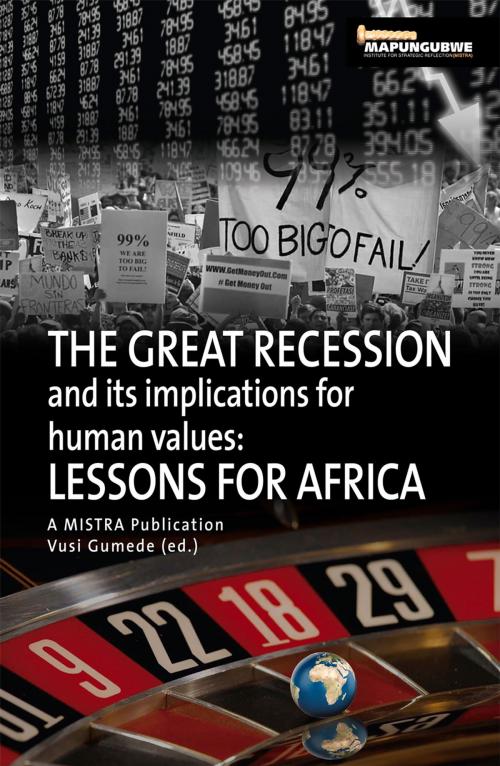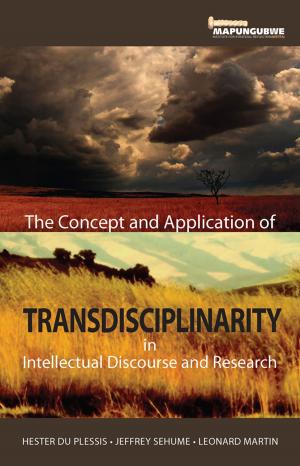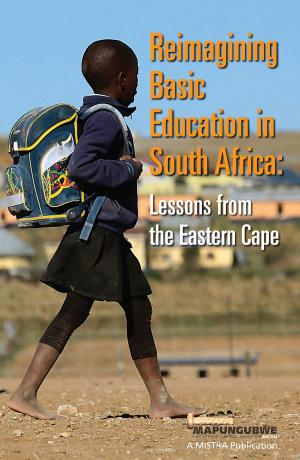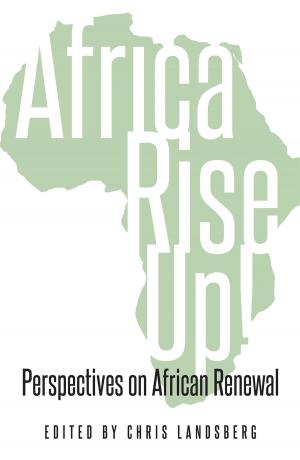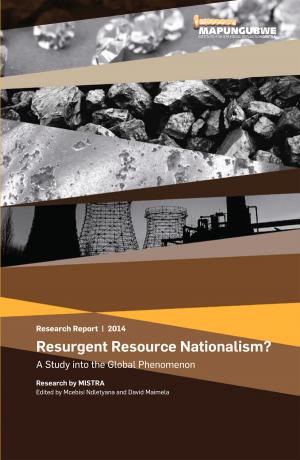Great Recession and its Implications for Human Values
Lessons for Africa
Business & Finance, Economics, Economic Conditions, Finance & Investing, Finance| Author: | Iraj Abedian, Patrick Bond, Charlotte du Toit, Akpan Ekpo, Lorenzo Fioramonti, Pali Leholhla, Thabo Mbeki, Lumkile Mondi, Joel Netshitenzhe, Devan Pillay, Samuel Oloruntoba | ISBN: | 9781928341239 |
| Publisher: | Real African Publishers | Publication: | November 1, 2016 |
| Imprint: | Real African Publishers | Language: | English |
| Author: | Iraj Abedian, Patrick Bond, Charlotte du Toit, Akpan Ekpo, Lorenzo Fioramonti, Pali Leholhla, Thabo Mbeki, Lumkile Mondi, Joel Netshitenzhe, Devan Pillay, Samuel Oloruntoba |
| ISBN: | 9781928341239 |
| Publisher: | Real African Publishers |
| Publication: | November 1, 2016 |
| Imprint: | Real African Publishers |
| Language: | English |
The earth has enough for everyone's need, but not everyone's greed. — Mahatma GandhiThe Great Recession, which started around 2007, stands out as the most significant crisis of global capitalism since the 1930s, both in scope and intensity. Although it was triggered by developments in the financial sector in the United States of America, its impact and implications have reverberated across the globe. Virtually all countries have been unable to escape its destructive swell: the interconnectedness that globalisation has fostered made certain of that. As authors in this book assert, the growing sectoral dominance of finance capital and its rapacious licence are the immediate and prime causes of the crisis. However, trends in the real economy over the past three decades created a systemic underpinning to the crisis, and those include the emergence of large corporate behemoths in manufacturing and services, advances in information and communications technologies and improvements in production techniques, the off-shoring of production sites in search of cheap labour, and household debt. At the same time, degradation of the environment has proceeded apace. The period leading up to the Great Recession was also characterised by high rates of economic growth in most parts of the world. Combined with that was the lifting of swathes of humanity from abject poverty. With a few exceptions, particularly in Latin America, the manner in which the surplus is apportioned has resulted in rising inequality, with women and youth most adversely affected. That is the fundamental question of political economy that most of the essays in this book seek to address Humanity is faced with a poly-crisis straddling economics, politics, and environmental and security issues. With that sense of unguided drift, the need for debate on alternative approaches to the management of social relations stands out in even bolder relief, and that is precisely what the essays in this volume set out to do. The book examines the crisis from theoretical and empirical perspectives, and in some instances, the authors do not quite concur on the approaches required. However, running like a golden thread through all the inputs is that the State has a critical role to play in reconfiguring social relations, proceeding from the perspective that markets, left to their own devices, can wreak havoc on the commons. Above all, social relations should be premised on humane values. Humanity is faced with a poly-crisis straddling economics, politics, and environmental and security issues. With that sense of unguided drift, the need for debate on alternative approaches to the management of social relations stands out in even bolder relief, and that is precisely what the essays in this volume set out to do. The book examines the crisis from theoretical and empirical perspectives, and in some instances, the authors do not quite concur on the approaches required. However, running like a golden thread through all the inputs is that the State has a critical role to play in reconfiguring social relations, proceeding from the perspective that markets, left to their own devices, can wreak havoc on the commons. Above all, social relations should be premised on humane values.
The earth has enough for everyone's need, but not everyone's greed. — Mahatma GandhiThe Great Recession, which started around 2007, stands out as the most significant crisis of global capitalism since the 1930s, both in scope and intensity. Although it was triggered by developments in the financial sector in the United States of America, its impact and implications have reverberated across the globe. Virtually all countries have been unable to escape its destructive swell: the interconnectedness that globalisation has fostered made certain of that. As authors in this book assert, the growing sectoral dominance of finance capital and its rapacious licence are the immediate and prime causes of the crisis. However, trends in the real economy over the past three decades created a systemic underpinning to the crisis, and those include the emergence of large corporate behemoths in manufacturing and services, advances in information and communications technologies and improvements in production techniques, the off-shoring of production sites in search of cheap labour, and household debt. At the same time, degradation of the environment has proceeded apace. The period leading up to the Great Recession was also characterised by high rates of economic growth in most parts of the world. Combined with that was the lifting of swathes of humanity from abject poverty. With a few exceptions, particularly in Latin America, the manner in which the surplus is apportioned has resulted in rising inequality, with women and youth most adversely affected. That is the fundamental question of political economy that most of the essays in this book seek to address Humanity is faced with a poly-crisis straddling economics, politics, and environmental and security issues. With that sense of unguided drift, the need for debate on alternative approaches to the management of social relations stands out in even bolder relief, and that is precisely what the essays in this volume set out to do. The book examines the crisis from theoretical and empirical perspectives, and in some instances, the authors do not quite concur on the approaches required. However, running like a golden thread through all the inputs is that the State has a critical role to play in reconfiguring social relations, proceeding from the perspective that markets, left to their own devices, can wreak havoc on the commons. Above all, social relations should be premised on humane values. Humanity is faced with a poly-crisis straddling economics, politics, and environmental and security issues. With that sense of unguided drift, the need for debate on alternative approaches to the management of social relations stands out in even bolder relief, and that is precisely what the essays in this volume set out to do. The book examines the crisis from theoretical and empirical perspectives, and in some instances, the authors do not quite concur on the approaches required. However, running like a golden thread through all the inputs is that the State has a critical role to play in reconfiguring social relations, proceeding from the perspective that markets, left to their own devices, can wreak havoc on the commons. Above all, social relations should be premised on humane values.
